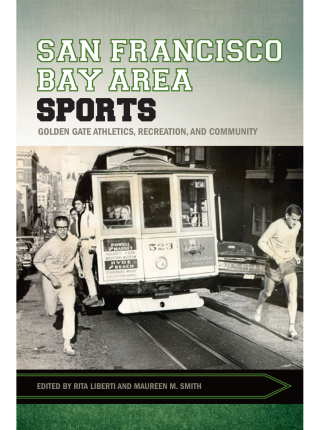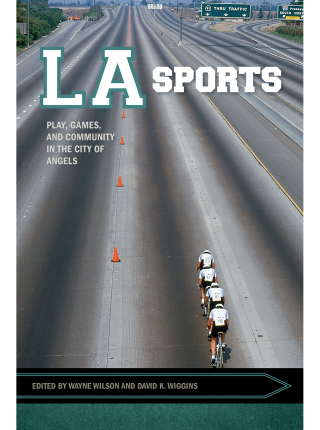Once considered a kind of delinquent activity, skateboarding is on track to join soccer, baseball, and basketball as an approved way for American children to pass the after-school hours. With family skateboarding in the San Francisco Bay Area as its focus, Moving Boarders explores this switch in stance, integrating first-person interviews and direct observations to provide a rich portrait of youth skateboarders, their parents, and the social and market forces that drive them toward the skate park.
This excellent treatise on the contemporary youth sports scene examines how modern families embrace skateboarding and the role commerce plays in this unexpected new parent culture, and highlights how private corporations, community leaders, parks and recreation departments, and nonprofits like the Tony Hawk Foundation have united to energize skate parks—like soccer fields before them—as platforms for community engagement and the creation of social and economic capital.
Interview on BYURadio. (Segment begins at 22:30)
Matthew Atencio is associate professor of kinesiology and codirector of the Center for Sport and Social Justice at California State University, East Bay.
Becky Beal is professor of sociology and philosophy of sport at California State University, East Bay, and the author of Skateboarding: The Ultimate Guide.
E. Missy Wright is assistant professor of kinesiology and codirector of the Center for Sport and Social Justice at California State University, East Bay.
ZáNean McClain is associate professor of kinesiology at California State University, East Bay.
“For decades, skateboarders have considered themselves outside of mainstream culture. The skateboard, for these folks, is an emblem of independence, liberty, and creative provocation. As a lifelong skateboarder, I found Moving Boarders to be an accurate reflection of skateboarding’s cultural qualities. More than ever, skateboarding presents a healthy—if sometimes subversive—option for today’s youth. Moving Boarders is a vital account of what works in skateboarding.”
—Peter Whitley, Programs Director, Tony Hawk Foundation

Sport, Culture, and Society is a series from the University of Arkansas Press that publishes monographs and collections for academics and general readers in the humanities and social sciences. Its focus is the role of sport in the development of community and the forging of individual, local, regional, and national identities.
Sport is an extraordinarily important phenomenon that pervades the lives of many people and has enormous impact on society in an assortment of different ways. At its most fundamental level, sport has the power to bring people great joy and satisfy their competitive urges while at once allowing them to form bonds and a sense of community with others from diverse backgrounds and interests and various walks of life. Sport also makes clear, especially at the highest levels of competition, the lengths that people will go to achieve victory as well as how closely connected it is to business, education, politics, economics, religion, law, family, law, family, and other societal institutions. Sport is, moreover, partly about identity development and how individuals and groups, irrespective of race, gender, ethnicity or socioeconomic class, have sought to elevate their status and realize material success and social mobility.
Introduction
Youth Sports and the Urban Skateboarding Landscape
1. Neo-liberalism and the New Urban Spaces of Skateboarding
2. Social Enterprise Skateboarding Organizations: The Installation of New Public-Private Spaces for Youth and Community Development
3. “They Were All About Police, Police, Police…We Don’t Need Police, We Need Parents”: Bay City’s Adult Organized Social Space
4. “I Want the Platform and Everybody’s Welcome”: Oakland’s Creation of Skateboarding “Hood Cred”
5. “There’s No End to The Pop Ups, the Towers, the High Rises, the Mid Rises, the Samsung’s and the Oracle’s”: Skateboarding in San Jose, “The Capital of Silicon Valley”
6. The Use of Skate Parks to Create New Spaces of Values for Youth, Families, and Urban Communities
Winner, 2019 NASSS Outstanding Book Award, presented by the North American Society for the Sociology of Sport

Adopted at: Colorado State University
Course: SPMT 536 Sport and Communities
Course Description: Examines sport as a social institution that enables social interaction, and reflects, reinforces, and creates societal norms.
Professor: Ajhanai Newton
Term: Spring 2021
Adopted at: Lock Haven University of Pennsylvania
Course: SPRT 601 Sport in American Culture
Course Description: Examines the sociocultural environment in which sport exists, including detailed evaluation of the impact of such issues as gender, race, media, social stratification, ethnicity, mass media and commercialization, politics, and leadership from historical and contemporary sociocultural perspectives. Focuses on American cultural ideologies throughout history and their interplay with both amateur and professional sport.
Professor: Dain TePoel
Term: Spring 2021





